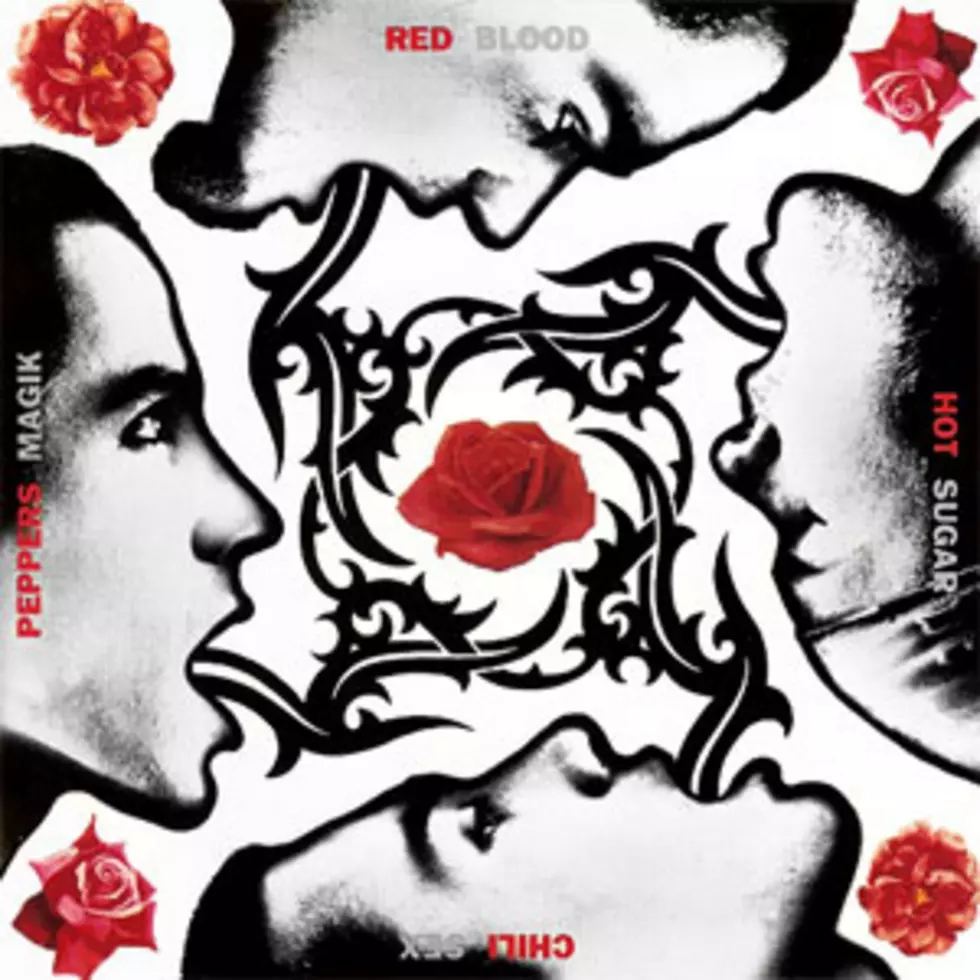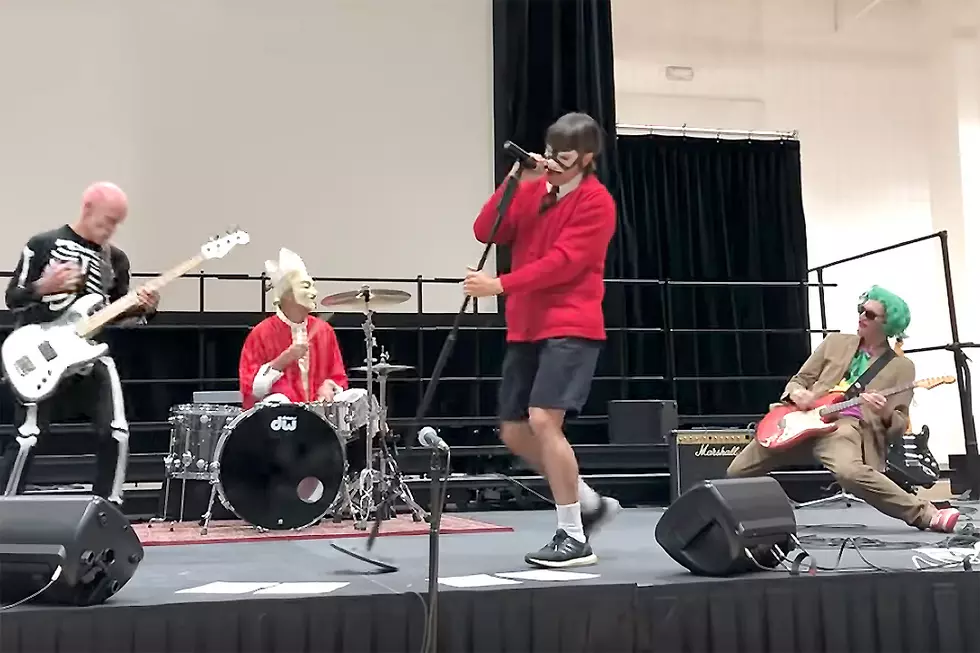
22 Years Ago: Red Hot Chili Peppers’ ‘Blood Sugar Sex Magik’ Album Released
Following up the foot-in-the-door mainstream success of 'Mother’s Milk,' the Red Hot Chili Peppers released their high-water mark, the most popular record of their career, ‘Blood Sugar Sex Magik.' Today, it turns the ripe old age of 22.
Known for its string of hit singles -- ‘Under the Bridge,’ ‘Give It Away,’ ‘Suck My Kiss’ and ‘Breaking the Girl' -- the album doesn't rock as hard as its predecessor. That's possibly because of producer Rick Rubin, who sniffs out hits like a police dog, but it's even likelier because the band had found its sweet spot. Here, they tone down the off-the-wall, George Clinton-like funk vamping of past efforts and turn up the Jimi Hendrix-style riffage of the young guitar genius John Frusciante. They also deliver more melodic, radio-friendly songs. That isn’t to say the album hinges solely on the "new" formula; ‘Give It Away’ is basically a melody-less hip-hop song, with a very fringe guitar line, and the entire song is built on Flea’s Fat Albert chunky bass riff and Anthony Kiedis’ percussive rap.
As anyone who listened to the radio or watched MTV in '91 remembers, the Peppers practically owned the era's airwaves, and only Nirvana were more ubiquitous. ‘Under the Bridge’ seemed to be on a 24-hour loop and was the staple "slow song" at school dances. ‘Breaking the Girl’ was the perfect wispy pre-alternative-rock-era acoustic ballad, and it smacks of the stuff Pearl Jam, who debuted with ‘Ten’ a month earlier, would pepper on their sophomore disc, ‘Vs.’ And the aforementioned ‘Give It Away’ predated and laid the groundwork for heavier rap-metal bands like Korn, Limp Bizkit and Slipknot. And in the truest form of ’90s alt-rock flattery, even comedian Weird Al Yankovic did a spoof medley of ‘Under the Bridge’ and ‘Give It Away’ in the hilarious ‘Flintstones’-themed ‘Bedrock Anthem.’
More than anything, ‘Magik’ thrust the Red Hot Chili Peppers into superstardom, making them one of the most popular bands in the world. But the overnight success wasn’t easy for all of the members, and after touring the album through May 1992, guitarist John Frusciante, who’d joined at the beginning of ‘Mother’s Milk,’ quit at the height of the band’s success. The album would eventually hit No. 3 in the U.S. and No. 5 in the U.K. -- a respectable cross-Atlantic showing for such an American-sounding band -- and go seven and three times platinum, respectively.
Frusciante would not return to the band until 1998, and his space was temporarily filled by fellow alt-rock guitar god Dave Navarro, of Jane’s Addiction fame. The Navarro lineup's 1995 follow-up, ‘One Hot Minute,’ would prove a letdown following the glorious pandemonium of the previous two albums, as Dave simply didn’t have Frusciante’s flexibility or innate chops.
As fate would have it, the same day ‘Magik’ hit the streets, DGC released its album of the decade, Nirvana's ‘Nevermind.' One might argue that Sept. 24, 1991, was the exact wrinkle in time when the Alternative Era and the Grunge Movement bifurcated the ’90s. The Chili Peppers had always been one of the quintessential "alternative" bands (and were one of the first, along with Jane’s Addiction), and they would help establish the genre as not only a melting pot of sounds and styles, but also as a form of music that even casual listeners could embrace.
Nirvana, on the other hand, would represent a new subversive set -- trumped-up punkoids from the planet grunge, raging against the machine for all the pissed-off youth of the time. Grunge was the stuff parents didn’t want their children listening to, though curiously, ‘Nevermind’ is markedly cleanr than ‘Magik,' as the latter is drenched in sex and drug references. 'Nevermind' has nary has a curse word, and the closest it gets to sex is line “I’m so horny” in ‘In Bloom,' or possibly 'Polly,' if your read into it enough. In a sense, this was the rock world’s version of the West Coast vs. East Coast rap wars, only it was California vs. Washington.
Second, it must be noted that Nirvana were coming basically out of nowhere with ‘Nevermind,’ having released their debut, ‘Bleach,’ two years earlier to pretty much no mainstream acclaim. The Chili Peppers, on the other hand, were on a roll -- so ‘Magik’ had already cracked the surface of the mainstream. In a sense, it was destined to be great. Which makes the success of ‘Nevermind’ all the more amazing. Without any ball rolling, Nirvana’s instant fame was a way bigger deal than the Chili Peppers’ -- so you can only imagine that if the pressure on Frusciante was too much to bear, Kurt Cobain, Krist Novoselic and Dave Grohl must have had it 10 times worse.
In terms of legacy, the hits from both ‘Magik’ and ‘Nevermind’ get roughly equal airplay these days, the most played Peppers singles being ‘Under the Bridge’ and ‘Give It Away.' It’s almost as if 'Magik' and 'Nevermind' live in parallel universes -- each bringing in a new generation of young fans to two vastly different genres. Without a doubt, the magic of ‘Magik’ is its crossover potential -- its way of hooking in casual pop fans with its many different styles (funk, punk, metal, hip-hop, pop). Maybe in that sense, it stands taller than the mono-genre giant ‘Nevermind.’
More From Diffuser.fm









